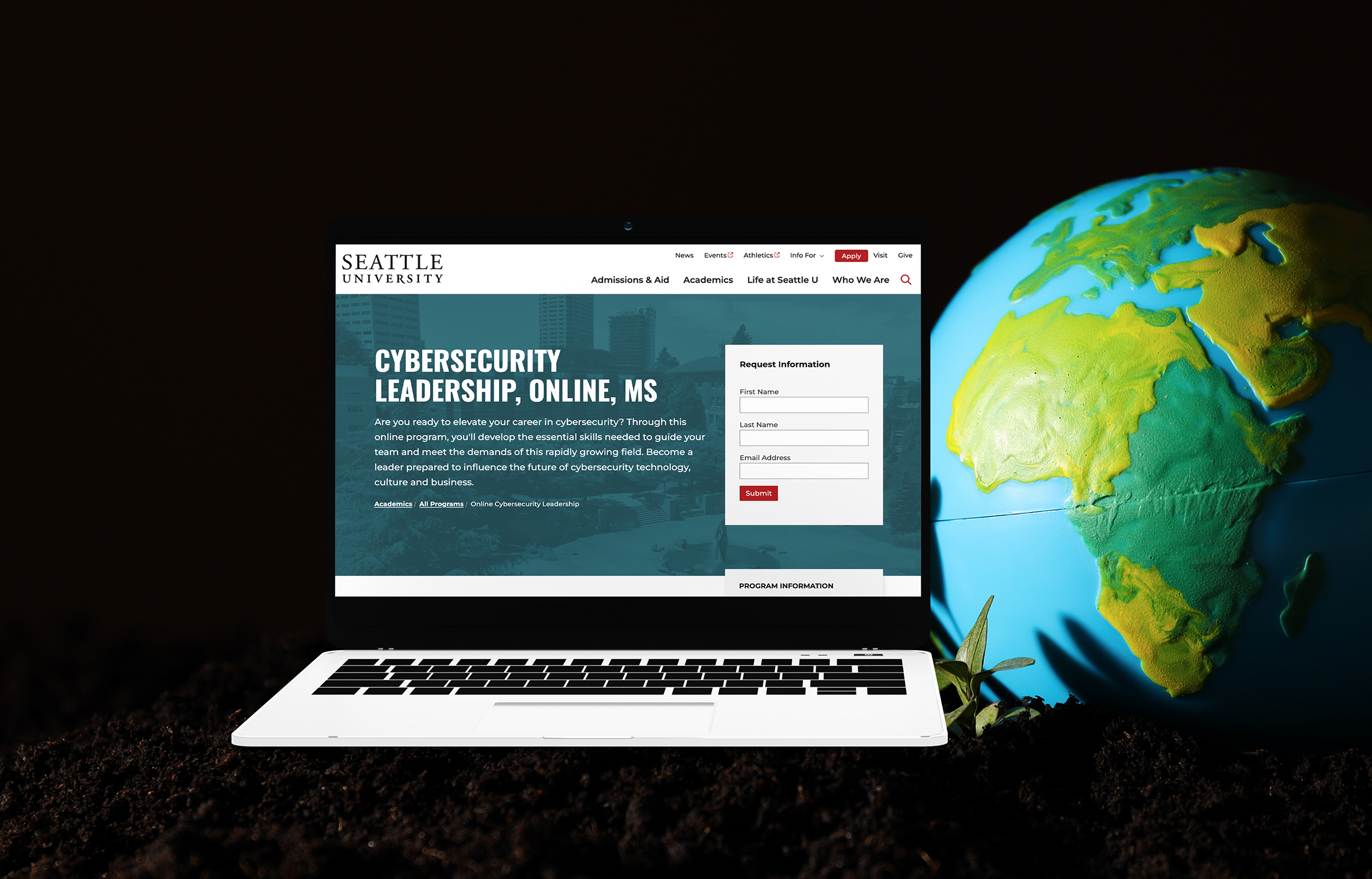Securing a Better Future
Written by Mike Thee
Wednesday, November 6, 2024
/0x3:2326x1487/prod01/channel_34/media/seattle-university/news-amp-stories/magazine/fall-2024/Cybersecurity.jpg)
New cybersecurity program prepares leaders to navigate an increasingly complex digital world.
For Erik Moore, PhD, cybersecurity means much more than viruses and firewalls, zero-days and patches.
That’s all part of it, to be sure, but for Moore, “it’s not just about technology. This is about the future of humanity and we’re all in on this … How can we make society stable enough so people all over the world can collaborate on (creating) new environmental solutions and health care treatments and better diplomacy so that we have more peace and less war?”
This past spring Moore joined Seattle University to launch and direct a new online graduate program in cybersecurity. Housed in the Albers School of Business and Economics, the program welcomed its first cohort of students in September.
True to Moore’s holistic approach to the subject, the curriculum includes all the technical aspects you’d expect from a program of its kind, but with an added layer. With courses covering such areas as ethics and law—and even some philosophy—the program prepares students to go beyond the nuts and bolts and become leaders and changemakers in an increasingly digitized, and permeable, world. Ultimately, Moore says, “We’re striving to not just improve the companies our students are at, but also to help society come up with better decisions, better ways of doing business, more humane and nurturing ways of interacting with people.”
“In discussing with industry leaders, we have received enthusiastic support for the program,” says Joseph Phillips, dean of Albers. “While there are many opportunities and programs on the technical side, finding people who can successfully take on leadership roles in cybersecurity is proving to be a challenge. It’s not just about technical skills but being able to understand the strategic role of cybersecurity in an organization and to bring others along with that understanding.”

“It’s not just about technology. This is about the future of humanity and we’re all in on this …”
—Erik Moore, PhD
Moore’s own professional path began in Fine Arts—he’s a sculptor and photographer. This led him to teaching graphic design, which in turn “got me into computers. I started teaching computers, studying computers and tearing computers apart.” Working at an under-resourced university, Moore increasingly found himself taking care of its network and in time he became the school’s functional chief technology officer.
Having built decades of experience in academia, industry and government—he continues to be involved with two companies in the private sector and is an international scholar in cybersecurity—Moore in recent years begun to contemplate retirement. It wasn’t long after he moved from Denver to the Seattle area to be closer to his grandchildren that friends started contacting him, encouraging him to apply for this new position at Seattle University. “They said I should do it, that it was what I always dreamed of. So that’s why I’m here.”
Adding to the appeal of building a program from the ground up is the type of university Moore has joined. Having served on the faculty of sister Jesuit school Regis University for two decades, SU’s mission speaks to him.
“I’m really a Star Trek scientific humanist in a lot of ways,” he says, “and what I find is that ethic of wanting to change the world and make it better has a deep resonance with the Jesuit tradition. I see a lot of technical cybersecurity programs out there, but right now there are very few programs like ours across the nation.”
More with Moore
On his time at Seattle University so far:
This is really a thriving environment and I feel privileged to be a part of it. I have appreciated the mentorship of Joseph (Phillips, dean of the Albers School of Business and Economics) and Amit (Shukla, dean of the College of Science and Engineering) has been a big contributor to the program. So many colleagues have reached out and offered to teach classes.
On the mindset of a cybersecurity professional:
A lot of people who are in cybersecurity think that it’s withering work and it can be sometimes. There’s crime out there—there always has been—but by doing this kind of work, we’re really transforming society in a great way. We’re offering more potential.
On what he likes to do outside of work:
I am a certified celestial navigator. I have never been across the Atlantic on a yacht. I would love to do that someday, but I know how to use a sextant and I know where I am on the planet. I also collect rocks. When I recently moved I donated a large collection of rocks to the University of Notre Dame. I love to travel. My wife is Japanese and so I speak Japanese and spend a lot of time in Japan.
/0x7:800x512/prod01/channel_34/media/seattle-university/news-amp-stories/images/albers-ai-photo.jpeg)
/0x142:2400x1658/prod01/channel_34/media/seattle-university/news-amp-stories/images/Helfgott-photo.JPG)
/0x38:2400x1554/prod01/channel_34/media/seattle-university/news-amp-stories/images/Jerron-Lowe-portrait.JPG)